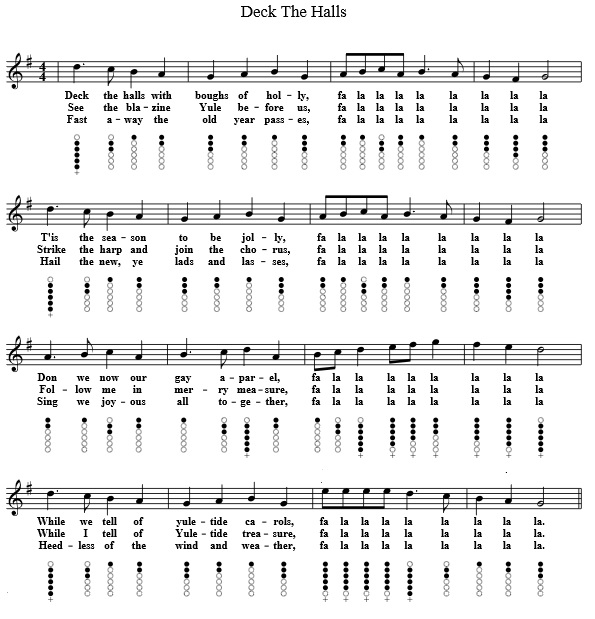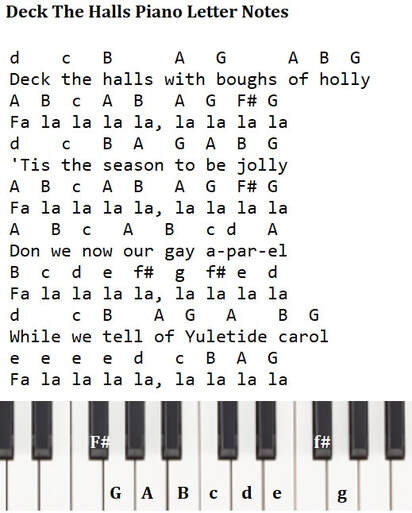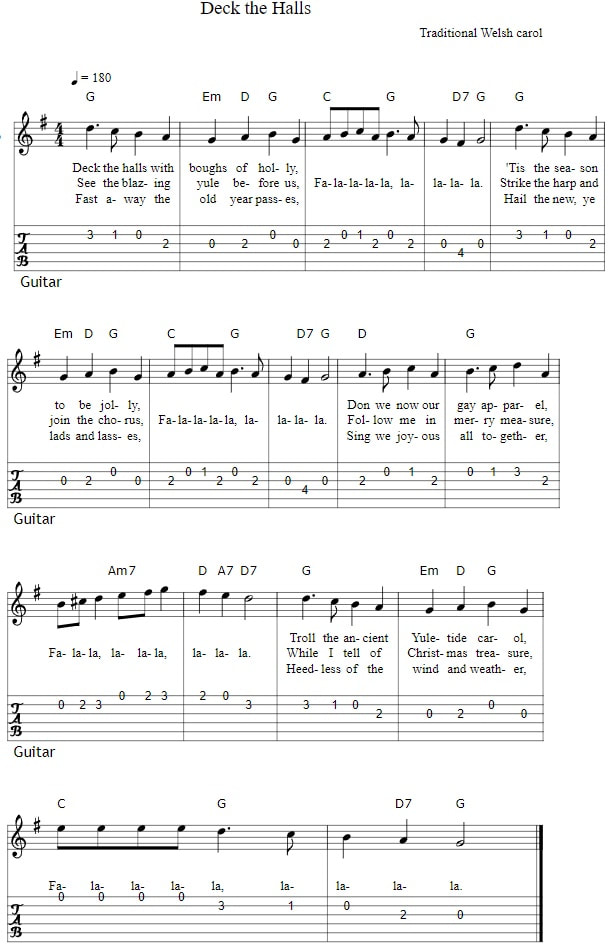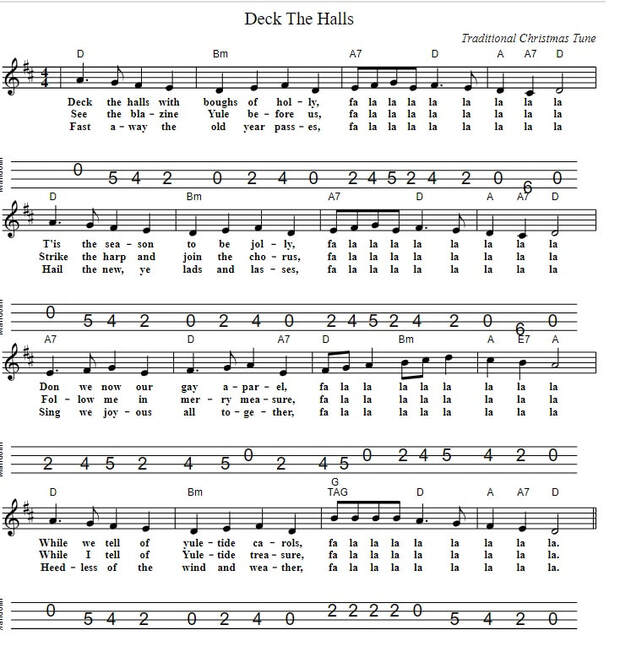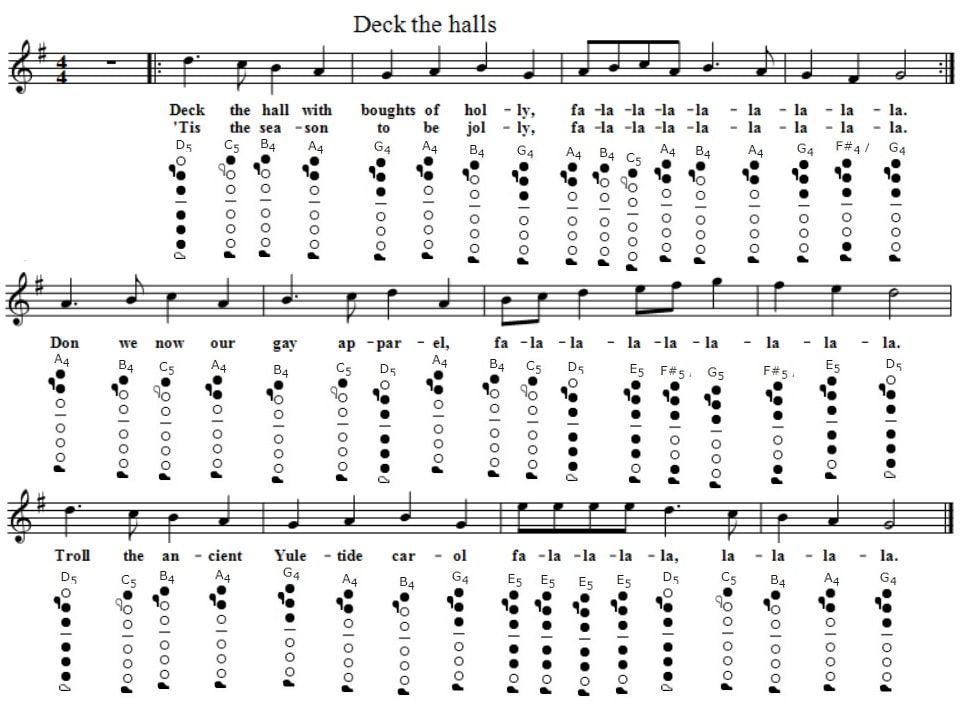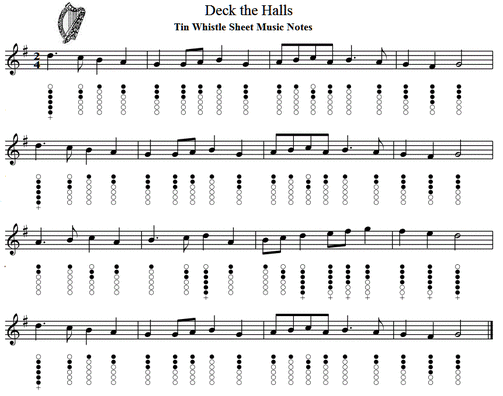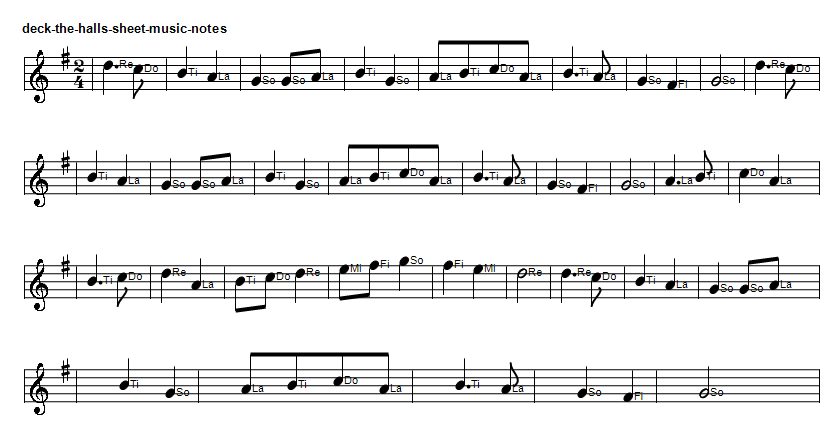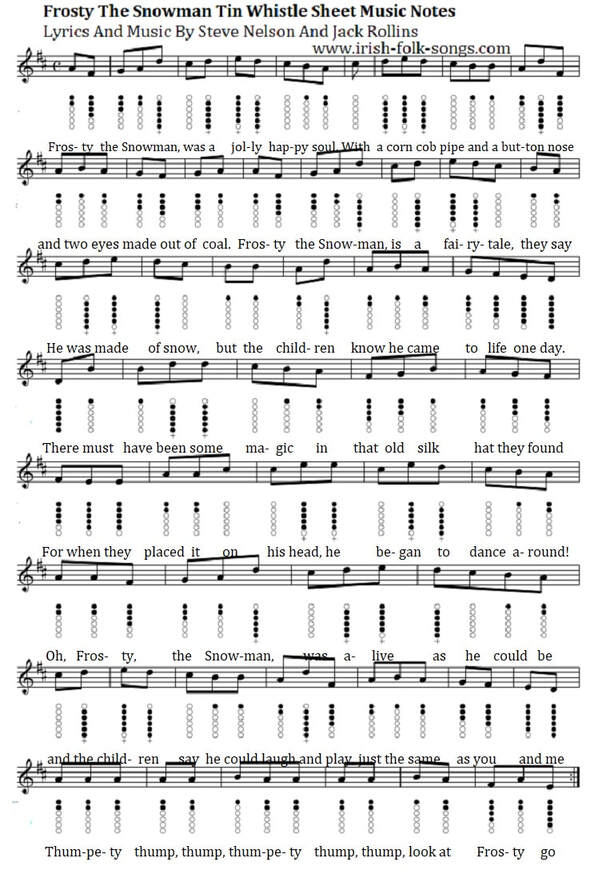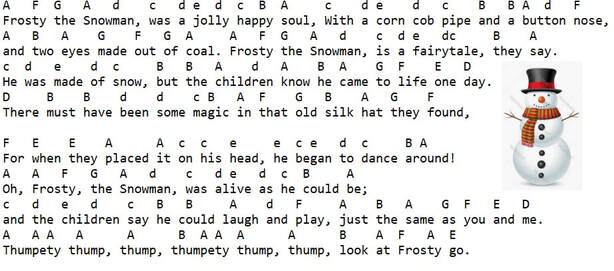Deck The Halls Tin Whistle Sheet Music
The flute finger chart notes now included. A traditional Christmas Carol. This is one of the most popular Christmas Carols. Deck the halls mandolin tab with chords and lyrics included in D. The tune of the song is said to originate in Wales in the 16th century. If your going to learn this tune remember that the first and second lines are basically the same. Also included is Frosty The Snowman which was never really a massive Christmas song. The melody of the song isn't great, and you got to have a catchy melody for it to become a great song, regardless of the lyrical content. The easy piano keyboard / melodica letter notes which are suited to the recorder or flute now added for beginners. Deck the halls guitar tab and chords included.
Introduction:
'Deck the Halls' is a popular Christmas carol that has been performed and enjoyed for centuries. Its catchy tune and joyful lyrics have made it a staple in holiday celebrations all over the world. However, the song's origins and meaning often go unnoticed as it is often regarded as just another festive tune. In this thesis, we will explore the history and significance of 'Deck the Halls' as a hymn, shedding light on its evolution and impact on Christmas traditions.
Historical Background:
'Deck the Halls' was originally a Welsh New Year's Eve carol titled 'Nos Galan' that dates back to the 16th century. The melody of the song was composed by Welsh harpist John Parry and was first published in Musical and Poetical Relics of the Welsh Bards in 1784. The lyrics, on the other hand, were written by Scottish musician Thomas Oliphant in 1862, who adapted the traditional Welsh verses and added the familiar 'fa-la-la' refrain. The song's title was changed to 'Deck the Halls' to better fit the Christmas theme.
Musical Analysis:
The tune of 'Deck the Halls' is upbeat and lively, with a 4/4 time signature and a major key signature, making it easy to sing and dance along to. The song's melody follows a simple pattern, with a range of just five notes, making it accessible to all. The use of repetition in the 'fa-la-la' chorus adds to its catchy and memorable nature. The lyrics are also simple and easy to remember, with a playful tone that captures the joy and merriment of the holiday season.
Symbolism and Meaning:
While 'Deck the Halls' may seem like a simple and light-hearted tune, it holds a deeper meaning and symbolism. The lyrics, 'Deck the halls with boughs of holly, Fa-la-la-la-la, la-la-la-la,' depict the tradition of decorating homes with holly branches during Christmas. Holly, with its evergreen leaves and red berries, has long been associated with Christ's birth and has been used as a symbol of hope and eternal life. The phrase 'Fa-la-la-la-la' is also believed to represent the joyous and carefree nature of the holiday season.
Impact on Christmas Traditions:
'Deck the Halls' has become an integral part of Christmas traditions across the globe. Its catchy tune and lyrics have made it a popular choice for caroling and festive gatherings. The song's association with decorating homes has also led to the tradition of hanging holly wreaths and garlands, creating a warm and inviting atmosphere. The song's message of joy and togetherness has also inspired the tradition of exchanging gifts and spending time with loved ones during the holiday season.
Conclusion:
In conclusion, 'Deck the Halls' is not just a fun and lively Christmas carol, but a significant hymn that captures the essence of the holiday season. Its origins as a Welsh New Year's carol and the adaptation of its lyrics to fit the Christmas theme, highlight the evolution of the song over the years. The song's simple yet meaningful lyrics, memorable tune, and impact on Christmas traditions make it a timeless classic that will continue to be cherished for generations to come.
'Deck the Halls' is a popular Christmas carol that has been performed and enjoyed for centuries. Its catchy tune and joyful lyrics have made it a staple in holiday celebrations all over the world. However, the song's origins and meaning often go unnoticed as it is often regarded as just another festive tune. In this thesis, we will explore the history and significance of 'Deck the Halls' as a hymn, shedding light on its evolution and impact on Christmas traditions.
Historical Background:
'Deck the Halls' was originally a Welsh New Year's Eve carol titled 'Nos Galan' that dates back to the 16th century. The melody of the song was composed by Welsh harpist John Parry and was first published in Musical and Poetical Relics of the Welsh Bards in 1784. The lyrics, on the other hand, were written by Scottish musician Thomas Oliphant in 1862, who adapted the traditional Welsh verses and added the familiar 'fa-la-la' refrain. The song's title was changed to 'Deck the Halls' to better fit the Christmas theme.
Musical Analysis:
The tune of 'Deck the Halls' is upbeat and lively, with a 4/4 time signature and a major key signature, making it easy to sing and dance along to. The song's melody follows a simple pattern, with a range of just five notes, making it accessible to all. The use of repetition in the 'fa-la-la' chorus adds to its catchy and memorable nature. The lyrics are also simple and easy to remember, with a playful tone that captures the joy and merriment of the holiday season.
Symbolism and Meaning:
While 'Deck the Halls' may seem like a simple and light-hearted tune, it holds a deeper meaning and symbolism. The lyrics, 'Deck the halls with boughs of holly, Fa-la-la-la-la, la-la-la-la,' depict the tradition of decorating homes with holly branches during Christmas. Holly, with its evergreen leaves and red berries, has long been associated with Christ's birth and has been used as a symbol of hope and eternal life. The phrase 'Fa-la-la-la-la' is also believed to represent the joyous and carefree nature of the holiday season.
Impact on Christmas Traditions:
'Deck the Halls' has become an integral part of Christmas traditions across the globe. Its catchy tune and lyrics have made it a popular choice for caroling and festive gatherings. The song's association with decorating homes has also led to the tradition of hanging holly wreaths and garlands, creating a warm and inviting atmosphere. The song's message of joy and togetherness has also inspired the tradition of exchanging gifts and spending time with loved ones during the holiday season.
Conclusion:
In conclusion, 'Deck the Halls' is not just a fun and lively Christmas carol, but a significant hymn that captures the essence of the holiday season. Its origins as a Welsh New Year's carol and the adaptation of its lyrics to fit the Christmas theme, highlight the evolution of the song over the years. The song's simple yet meaningful lyrics, memorable tune, and impact on Christmas traditions make it a timeless classic that will continue to be cherished for generations to come.
Included below are the piano keyboard / melodica letter notes.
Deck the halls guitar tab and chords
The flute finger chart notes are below.
Here's another version without the lyrics included in the sheet music.
Deck the halls solfege sheet music notes in G Major
Below is the list of sheet music and tin whistle songs that are in my ebooks. This is the largest collection of tin whistle songs ever put together.[over 800 songs ] Including folk, pop and trad tunes plus German And French songs along with Christmas Carols.
All of the sheet music tabs have been made as easy to play as was possible.
The price of the ebooks is €7.50
All of the sheet music tabs have been made as easy to play as was possible.
The price of the ebooks is €7.50
